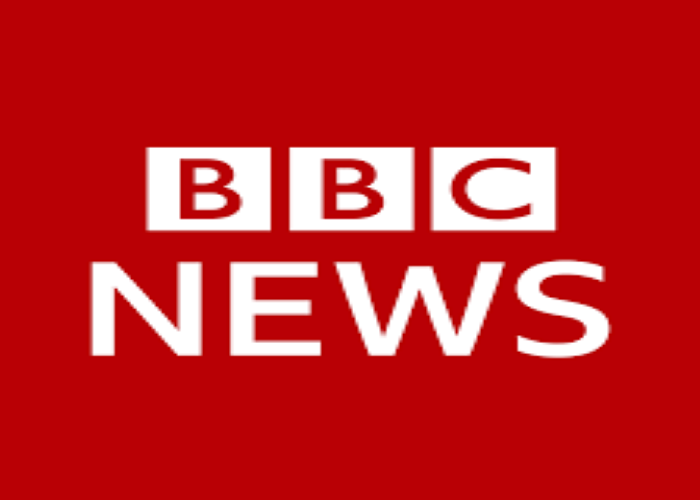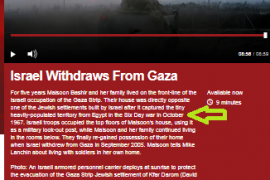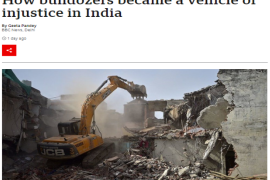Between March 13th and April 7th 2020 BBC audiences saw or heard reports on the topic of Coronavirus in the Gaza Strip on multiple platforms.
BBC Radio 4 & BBC World Service radio, March 13th and 14th:
BBC re-promotes the usual Gaza narratives in multiple Coronavirus reports
Interviewee: Dr Abdelnasr Sohob, WHO
“This is the story of Gaza’s hospitals: outdated, hard pressed and lacking many medicines and supplies. And now the health system must prepare for Coronavirus. […] It’s feared infection could thrive amid the Strip’s deep poverty and in the crowded refugee camps – problems that are compounded by the tangled politics here. Israel and Egypt’s crippling blockade – meant to stop weapons getting to Hamas militants – the recent bouts of fighting with Israel and the deep split between the two main Palestinian factions all add to the crisis.”
BBC News website, March 24th: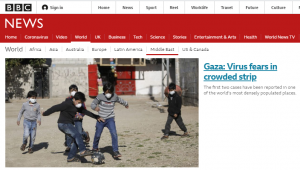
Mapping BBC messaging on Gaza and Corona
“Social distancing is almost impossible among large families living in Gaza’s crowded refugee camps and built-up neighbourhoods, raising fears that infection could spread fast and that overstretched hospitals could be overwhelmed. […] Gaza has been kept under blockade by Israel and Egypt since the militant group, Hamas, took full control of the territory in 2007.”
BBC Radio 4, March 25th:
BBC Radio 4 spreads inaccurate Gaza healthcare canard
Interviewees: Dr Khamis Elessy, Islamic University Gaza & Mark Lowcock, UNOCHA
“The warning comes…after the confirmation of two cases in the densely populated Gaza region – where a decade-long blockade has devastated the health services…”
BBC World Service radio, March 26th:
BBC WS isolates narrative from context in another Gaza Corona report
Interviewee: Matthias Schmale, UNRWA
“Gaza is the tiny strip of land between Israel and Egypt into which 2 million Palestinians are crammed under the governance of the internationally shunned Hamas movement.”
BBC World Service radio, March 31st:
More Corona-hooked Gaza Strip messaging on BBC WS radio
Interviewee: Najla Shawa, Oxfam
“And for the lock-down I mean Gaza has been always locked down. We totally know what this means. We can empathise of course with everyone in the world and this is a moment where everyone is kind of thinking about the other in this sudden crisis. But we Palestinians have known that for many, many years unfortunately.”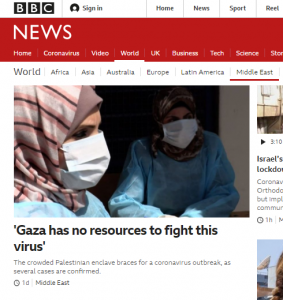
BBC News Channel & BBC News website, April 7th:
BBC News continues to push inaccurate Gaza healthcare narrative
Cited: Physicians for Human Rights – Israel
“The World Health Organisation’s medics are warning of a catastrophe if Gaza sees wide spread of the virus. The health system is just too fragile after nearly 14 years of blockade and cross-border conflict with Israel. One group, Physicians for Human Rights in Israel, warns that Gaza has only about 70 ICU beds, some of which are already occupied. A drop in the ocean of what people here would need.”
Many of those reports promoted the false notion that the state of healthcare in the Gaza Strip is primarily attributable to counter-terrorism measures imposed by Israel and Egypt following the 2007 violent take-over of the territory by the terrorist organisation Hamas.
Audiences were however not given any significant information on how infighting between Hamas and Fatah – along with Hamas’ prioritisation of terror over civilian welfare – has affected the standard of living and services such as water, power and healthcare in the Gaza Strip.
Notably, the same messaging concerning the partial blockade on the Gaza Strip has been promoted by political NGOs. NGO Monitor notes that:
“In the current context, NGOs have been using COVID-19 as an excuse to criticize legitimate anti-terror policies and to preemptively blame Israel for an outbreak in Gaza.”
Among the NGOs employing that tactic are Physicians for Human Rights-Israel which put out the statement quoted by the BBC in the April 7th report. Oxfam – which had a representative interviewed by the BBC on March 31st – co-signed a statement calling on “Israel to lift the 13-year closure on Gaza so that inter alia Gaza can equip itself with the necessary medical supplies” along with PHR-I. On March 24th – the day before a UNOCHA representative was interviewed by the BBC – the organisation claimed that “[t]he situation is particularly severe in the Gaza Strip, where the health system has been undermined by the longstanding Israeli blockade…”.
Given that the BBC has for years promoted the falsehood that the chronic shortages of medicines and medical supplies in the Gaza Strip are attributable to Israel’s counter-terrorism measures, it is not surprising to now see its generous amplification of the same talking point which is being used by political NGOs.
Were the corporation interested in providing its audiences with a realistic, accurate and impartial view of efforts to combat the Coronavirus pandemic in the Gaza Strip, BBC audiences would also have heard about the related training for medical teams in the Gaza Strip provided by Israel, the coordination of the entry of supplies to the territory and the testing in Israel of samples taken from patients in the Gaza Strip.
To date, however, BBC audiences have not been informed on those topics – or of the threats against Israelis issued by Hamas officials despite such cooperation.

